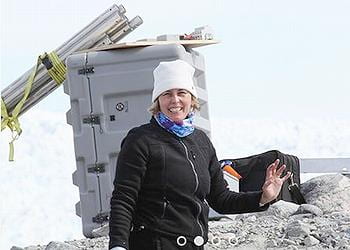PBS
David and Denise Holland, Climate Scientists
“The fact that such warm water was just now recorded by our team along a section of Thwaites grounding zone where we have known the glacier is melting suggests that it may be undergoing an unstoppable retreat that has huge implications for global sea-level rise.” — David Holland, director of New York University’s Environmental Fluid Dynamics Laboratory.
 David Holland is a professor of mathematics and atmosphere/ocean science at the Courant Institute of Mathematical Sciences at New York University and is the director of the Environmental Fluid Dynamics Laboratory (EFDL) in New York City. He studies phenomena relating to the Polar Regions and their impacts on our global climate. Holland’s current research focuses on the computer modeling of the interaction of the Earth’s ice sheets with ocean waters and the acquisition and implementation of observational data for model improvements.
David Holland is a professor of mathematics and atmosphere/ocean science at the Courant Institute of Mathematical Sciences at New York University and is the director of the Environmental Fluid Dynamics Laboratory (EFDL) in New York City. He studies phenomena relating to the Polar Regions and their impacts on our global climate. Holland’s current research focuses on the computer modeling of the interaction of the Earth’s ice sheets with ocean waters and the acquisition and implementation of observational data for model improvements.
Holland is a lead Principal Investigator on the MELT project. At the time this post was written, his most extensive fieldwork occurred on the Thwaites Glacier in the fall of 2019, where they measured the melting at the glacier’s ice-ocean interface. Acquiring these measurements is important to better understand the physical processes involved and the potential for triggering increased sea-level rise.
“Warm waters in this part of the world, as remote as they may seem, should serve as a warning to all of us about the potential dire changes to the planet brought about by climate change.” — David Holland
“This is unsustainable from the point of view of glacier mass balance as the warm waters are melting the glacier much faster than they can be replenished.” — Principal Investigator for NYU Abu Dhabi’s Center for Global Sea Level Change David Holland.
Warm tropical waters at depth can be found at many fjord locations all around Greenland. Their presence changes over time depending on the behavior of the Gulf Stream. Over the last two decades, warm tropical waters at depth have been found in abundance. Greenland outlet glaciers like Helheim have been melting rapidly and retreating since the arrival of these warm waters.
“We are surprised to learn that increased surface glacier melt due to warming atmosphere can trigger increased ocean melting of the glacier,” added Holland. “Essentially, the warming air and warming ocean water are delivering a troubling ‘one-two punch’ that is rapidly accelerating glacier melt.” — David Holland
Read more about the international Thwaites Glacier project.

Denise Holland is the Field Logistics, Outreach, and Media Officer for David Holland’s research team in New York and Abu Dhabi. She has been organizing and participating in Greenland expeditions for seven years at east and west coast locations. Holland has also organized a summer field school for New York University (NYU) undergraduate and graduate students for the last several years. At NYU New York, she plays a principal role in developing an Environmental Fluid Dynamics Laboratory (EFDL). Holding both a Business degree from Memorial University of Newfoundland and a French degree from McGill University, she is also currently completing an undergraduate degree in Art History from New York University.






